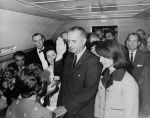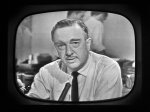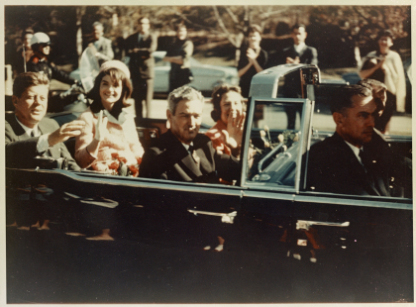Assassination of U.S. President John F. Kennedy
JFK assassination: Cronkite informs a shocked nation Published on Nov 17, 2013 by CBS Sunday Morning
"As The World Turns" was airing on CBS the afternoon of November 22, 1963, when Walter Cronkite broke in to tell the nation that President Kennedy had been shot. Coverage then went back to the soap opera, but not for long. Charles Osgood reports on how America learned of the shooting of a president. Read comments on YouTube
JFK Motorcade just before assassination, Nov. 22, 1963
November 22, 1963: Death of the President
November 22, 1963: Death of the President
John F. Kennedy
Presidential Library and Museum
Shortly after noon on November 22, 1963, President John F. Kennedy was assassinated as he rode in a motorcade through Dealey Plaza in downtown Dallas, Texas.
By the fall of 1963, President John F. Kennedy and his political advisers were preparing for the next presidential campaign. Although he had not formally announced his candidacy, it was clear that President Kennedy was going to run and he seemed confident about his chances for re-election.
At the end of September, the president traveled west, speaking in nine different states in less than a week. The trip was meant to put a spotlight on natural resources and conservation efforts. But JFK also used it to sound out themes—such as education, national security, and world peace—for his run in 1964. Read more
JFK: The legacy of America's 35th president
Published on Nov 17, 2013 by CBS Sunday Morning
He was the youngest elected president in history, coming into office at the height of the Cold War. Fifty years after his death, America is still fascinated with John F. Kennedy. Rita Braver talks with noted historians Robert Caro, Robert Dallek and Thurston Clarke about President Kennedy's legacy. Read comments on YouTube
Assassination of John F. Kennedy - Wikipedia
 Cecil Stoughton's iconic photograph as Lyndon B. Johnson is sworn in as U.S. President aboard Air Force One, Dallas Texas.
Cecil Stoughton's iconic photograph as Lyndon B. Johnson is sworn in as U.S. President aboard Air Force One, Dallas Texas.
Assassination of John F. Kennedy
Wikipedia
John Fitzgerald Kennedy, the 35th President of the United States, was assassinated at 12:30 p.m. Central Standard Time (18:30 UTC) on Friday, November 22, 1963, in Dealey Plaza, Dallas, Texas.[1] Kennedy was fatally shot by Lee Harvey Oswald while traveling with his wife Jacqueline, Texas Governor John Connally, and Connally's wife Nellie, in a presidential motorcade. A ten-month investigation from November 1963 to September 1964 by the Warren Commission concluded that Oswald acted alone in shooting Kennedy, and that Jack Ruby also acted alone when he killed Oswald before he could stand trial.[2] Kennedy's death marked the fourth and latest successful assassination of an American President. Vice President Lyndon B. Johnson was subsequently elevated to the office of President.
In contrast to the conclusions of the Warren Commission, the United States House Select Committee on Assassinations (HSCA) concluded in 1979 that Kennedy was "probably assassinated as a result of a conspiracy."[3] The HSCA agreed with the Warren Commission in that Kennedy and Connally’s injuries were caused by Oswald’s three rifle shots, but they also determined the existence of additional gunshots based on analysis of an audio recording and therefore "...a high probability that two gunmen fired at [the] President."[4][5] The Committee was not able to identify any individuals or groups involved with the conspiracy. In addition, the HSCA found that the original federal investigations were "seriously flawed" in respects to information sharing and the possibility of conspiracy.[6] As recommended by the HSCA, the acoustic evidence indicating conspiracy was subsequently reexamined and rejected.[7]
In light of investigative reports determining that "reliable acoustic data do not support a conclusion that there was a second gunman", the Justice Department has concluded active investigations, stating "that no persuasive evidence can be identified to support the theory of a conspiracy in … the assassination of President Kennedy".[8] However, Kennedy's assassination is still the subject of widespread debate and has spawned numerous conspiracy theories and alternative scenarios. Polling in 2013 showed that 60% of Americans believe that a group of conspirators was responsible for the assassination.[9][10]
Walter Cronkite On The Assassination Of JFK - by NPR
 CBS News anchor Walter Cronkite reports that President John F. Kennedy was assassinated in Dallas on Nov. 22, 1963.
CBS News anchor Walter Cronkite reports that President John F. Kennedy was assassinated in Dallas on Nov. 22, 1963.
Walter Cronkite On The Assassination Of John F. Kennedy
National Public Radio - NPR
November 22, 2013
The story of the assassination of President John F. Kennedy has been told many times by many people. Among those who told it first was the late Walter Cronkite. He anchored the CBS News coverage during the first hours after bullets hit the president in Dallas on Nov. 22, 1963, 50 years ago Friday.
A decade ago, Cronkite put together a story about that fateful day for NPR. He combined his recollections with several remarkable recordings from the day of the assassination, recordings few had heard before.
Cronkite's reminiscences were rebroadcast Friday on All Things Considered. The audio of the story is above.
Cronkite, who covered some of the biggest stories of the last half of the 20th century, remembered that Friday in 1963 vividly: a slow day that burst into action when the first dispatches from Dallas went out.
"UPI teletypes around the world started ticking out the news," Cronkite recalled. "One of them was on the communications deck of Aircraft 972, where the radio officer blinked in disbelief at what he read."
That plane — which held two-thirds of Kennedy's Cabinet, including Secretary of State Dean Rusk — was 900 miles west of Honolulu, en route to Japan, when the news came that the president had been shot. Tape of the ground-to-air communications between 972 and the Situation Room in Washington, D.C., sat largely unnoticed for decades at the National Archives. The tapes were recorded by the Signal Corps at Andrews Air Force Base.
We've posted here those recordings, which Cronkite described as "a strikingly immediate document of men caught in a historic crisis," in both condensed and unabridged form. In addition to communications with Aircraft 972, the National Archives tapes record dispatches from Air Force One as it carried Kennedy's coffin and the newly sworn-in President Lyndon Johnson back to the capital. Read more
TV Reports of JFK Assassination
Published on Apr 26, 2014
Watch TV Reports of the JFK Assassination as Walter Cronkite announces death of President Kennedy on CBS News.
NOVEMBER 17, 2013, 10:04 AM "As The World Turns" was airing on CBS the afternoon of November 22, 1963, when Walter Cronkite broke in to tell the nation that President Kennedy had been shot. Coverage then went back to the soap opera, but not for long. Charles Osgood reports on how America learned of the shooting of a president.
In this video, CBS News' Walter Cronkite reports live coverage of the events as they happened. From initial reports of the shooting, to taking a livelook of the scene and unconfirmed information from Dallas, to citing field correspondent Dan Rather, to then officially getting word that JFK had been killed.
Cronkite informed his viewers of the shocking events of a day that changed American history. Read comments on YouTube







































































































































